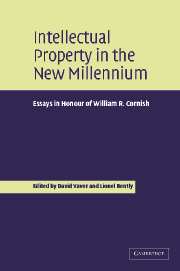Book contents
- Frontmatter
- Contents
- List of contributors
- Foreword
- Preface
- General intellectual property
- 1 International intellectual property jurisprudence after TRIPS
- 2 Harmony and unity of European intellectual property protection
- 3 Oskar Hartwieg's thoughts on the English legal system
- 4 Intellectual property in a peripheral jurisdiction: a matter of policy?
- Patents and plant protection
- Trade marks and unfair competition
- Copyright, moral and neighbouring rights
- William R. Cornish – curriculum vitae
- Index
1 - International intellectual property jurisprudence after TRIPS
Published online by Cambridge University Press: 25 May 2010
- Frontmatter
- Contents
- List of contributors
- Foreword
- Preface
- General intellectual property
- 1 International intellectual property jurisprudence after TRIPS
- 2 Harmony and unity of European intellectual property protection
- 3 Oskar Hartwieg's thoughts on the English legal system
- 4 Intellectual property in a peripheral jurisdiction: a matter of policy?
- Patents and plant protection
- Trade marks and unfair competition
- Copyright, moral and neighbouring rights
- William R. Cornish – curriculum vitae
- Index
Summary
International law and intellectual property rights
As in many other fields of intellectual property law, Professor Cornish was a pioneer in the way in which his commentaries and treatises on British intellectual property law were the first to locate that law in its European jurisprudential context. As the counterpart Herchel Smith Professor at the University of London, this contribution attempts to broaden that perspective to take account of the international law impact following the promulgation of the TRIPs Agreement.
Intellectual property rights exist primarily by virtue of national laws. So-called global intellectual property rights are a bundle of nationally enforceable rights. However, it is true to say that in most countries, those national rights exist not only as a consequence of domestic legislation or jurisprudence, but also because of international, multilateral, bilateral and regional obligations. In a number of regional associations, such as the European Union, there is the possibility of regional legislation either with direct national effect, or which prescribes national intellectual property norms. International intellectual property laws play an important role in harmonizing national substantive and procedural rules. This is particularly the case with the WTO Agreement on Trade-Related Aspects of Intellectual Property Rights (TRIPs), which prescribes domestically enforceable norms for the protection of intellectual property rights as a condition of membership of the WTO.
- Type
- Chapter
- Information
- Intellectual Property in the New MillenniumEssays in Honour of William R. Cornish, pp. 3 - 19Publisher: Cambridge University PressPrint publication year: 2004
- 1
- Cited by



